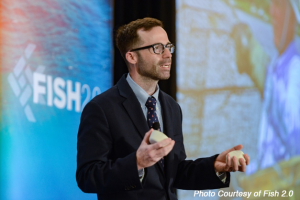Synthetic, Sustainable Bait Featured at Impact Investment Conference
Kepley BioSystems among Most Promising Companies at 2017 Fish 2.0 Innovation Forum
GREENSBORO, NORTH CAROLINA, U.S., December 5, 2017 /EINPresswire.com/ -- Kepley BioSystems (KBI) was one of 40 of the most promising sustainable seafood companies chosen to present their business and products at the 2017 Fish 2.0 Innovation Forum held on November 7-8, 2017, at Stanford University. KBI placed in the top tier of its segment, and the final awards from the academic and impact investment participants’ ratings will be announced later this month.Bringing sustainably-minded marine enterprises to Silicon Valley for the first of such conferences, 2017 Fish 2.0 Innovation Forum & Finals focused on "sustainability," which was also a founding tenet at KBI. The featured KBI invention was a synthetic bait engineered to revitalize fishing communities and preserve ocean ecosystems. Traditionally, wild-caught pelagic fish, collectively known as “forage fish,” have been the indispensable bait used for attracting crab and lobsters to traps. As these ecologically vital fish have been increasingly over-utilized and subject to erratic pricing and sporadic shortages, commercial fisheries have needed consistently available and affordable options more than ever.
OrganoBait™ is the revolutionary KBI approach that provides a disruptive alternative. It uses synthetically derived chemistry to deliver the same naturally occurring chemo-attractant nanoparticles as those emitted from traditional fish-based bait to effectively and safely attract crustaceans. KBI developed OrganoBait™ at the Joint School of Nanoscience and Nanoengineering in Greensboro, North Carolina, with grants from federal and state agencies, including the National Science Foundation, NOAA’s North Carolina Sea Grant program, and the North Carolina Department of Commerce.
“With more than one-third of global fish stocks depleted and catches declining each year, technological innovations – or ‘seatech’ – will be required to preserve the ocean and the hard-working fishing communities that provide the world with one the best and most consumed sources of protein,” said Dr. Anthony Dellinger, president of Kepley BioSystems, “In recent years, outmoded techniques and a dearth of advances have strained marine resources that were once-considered unlimited.
“These realities have ushered in a new era of entrepreneurs and impact-focused funding, shaping an industry dedicated to resource conservation and more sustainable seafood. In fact, Fish 2.0 has been instrumental in ensuring global seafood security by connecting promising start-ups with like-minded investors.”
Monica Jain, founder of Fish 2.0, echoed this sentiment, “We noticed that investors in the field were having a hard time finding fisheries deals, and fishery business owners were frustrated that investors had no interest. We created Fish 2.0 to build connections between the groups.” By making global collaboration and networking possible, Fish 2.0 has made a lasting impact on the seafood industry and the communities that it serves, while providing a platform for new developments and change. By highlighting and nurturing small businesses such as Kepley BioSystems, it is helping to preserve oceans on a large-scale.
Learn more about how the KBI applied nanoscience to develop this disruptive innovation with global impact at www.kepleybiosystems.com/organobait/.
About Kepley BioSystems
Kepley BioSystems is a North Carolina biotech founded in 2013 and focused on disruptive innovations and global solutions, including: sustainable, synthetic crustacean and pelagic fish bait; redefining aquaculture feeds; developing enriched feed for migrating shorebirds; ranching horseshoe crabs to sustainably harvest LAL, vital to ensuring the safety of pharmaceuticals and medical devices; bringing laboratory quality to bedside testing; and introducing an autologous therapy for breast cancer as an alternative to chemotherapy. KBI originated at the Joint School of Nanoscience and Nanoengineering (JSNN), North Carolina A&T State University and The University of North Carolina at Greensboro. Now located at the Gateway University Research Park proximal to JSNN, KBI is led by Professor Christopher Kepley and Dr. Anthony Dellinger, working in collaboration with lead inventor Terry E. Brady, located on the Caribbean island of Anguilla, British West Indies.
About Fish 2.0
The goal of Fish 2.0 is to create the business growth needed to drive social and environmental change in the seafood supply chain. Fish 2.0 aims to build the knowledge and connections needed to increase investment in the sustainable seafood sector, while allowing competitors to improve their business model and connect with investors. In turn, participating investors gain early access to new deals and discover how supporting sustainable seafood enhances their professional profiles.
###
Anthony Dellinger
Kepley BioSystems Incorporated
336-217-5163
email us here
Legal Disclaimer:
EIN Presswire provides this news content "as is" without warranty of any kind. We do not accept any responsibility or liability for the accuracy, content, images, videos, licenses, completeness, legality, or reliability of the information contained in this article. If you have any complaints or copyright issues related to this article, kindly contact the author above.


